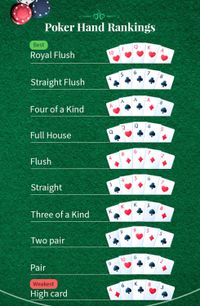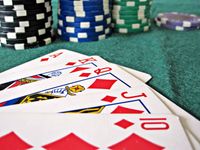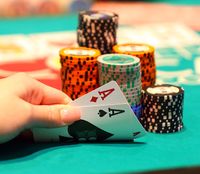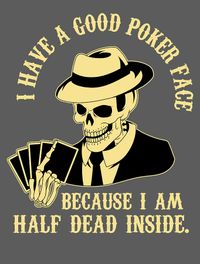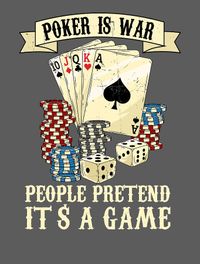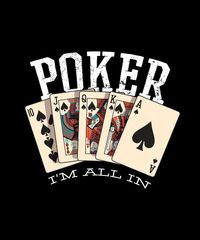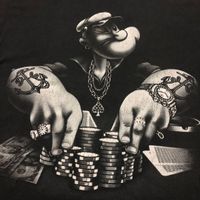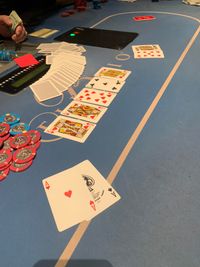Poker Tip #1 - Think About Ranges, Not Hands
It doesn't matter what type of casino poker you play: one of the easiest ways to spot average and beginner poker players is to look at how they think about what their opponent has.
Beginner poker players try and put somebody on a specific poker hand.
Advanced poker players think in terms of ranges. This type of thinking that can be extremely important when calculating pot odds.
A range is the entire spectrum of poker hands somebody can have in a specific situation. For example, player X can have a flush, top pair, middle pair, bottom pair, a draw, ace-high or a complete air-ball bluff.
Good players who have already gone through a few poker strategy articles understand that player X will show up with this entire range of hands with various frequencies. They don't focus on identifying a single winning hand, but they try and figure out those frequencies and then make the best play.
Average players try to put an opponent on exactly A♥J♥ (or some other specific hand) because that's "what their gut tells them."
If there's one thing you need to know when you learn the game, this is that poker strategy tips and 'gut feeling' don't go well together. Basing your tournament strategy or cash game play on what you 'feel' is never a good idea.
In the first video of this beginner's guide to poker tips for beginners, poker pro Jason Wheeler explains how uses every possible information available to understand his opponent's cards and choose his play.
Poker Tip #2 - Ditch Your Favorite Hand
A lot of people have a favorite hand. I know that every time I get dealt the old 9X7X-suited my eyes light up and I want to play it so bad! However, in reality, I know that 9X7X-suited is a mediocre hand. Definitely not one of the best starting hands you can hey in a game of Texas hold'em. It makes sense to play it in some spots — late position, for instance, in an unopened pot.
But it should almost always be folded in early position. If you currently have some favorite starting hands, that's fine — most people do. But don't give them preferential treatment and make bad plays with it.
Winning poker is about math and cold hard logic, not superstition.
Poker Tip #3 - Adopt a Consistent Strategy
Another big key to becoming a great poker player (and perhaps one of the most important poker tips on this strategy guide) is to consistently apply a winning strategy.
It is not okay suddenly to change things up (e.g. to open with 9X7X-suited from early position or turn yourself into a calling station) just because you are bored or tilted.
All of your learning, experience and study over the years has given you a body of knowledge telling you how to play Texas Hold 'Em.
But your poker strategy only actually matters if you apply it at the poker tables all the time.Every hand counts and every session counts. The best poker players, those ones who know how to win at Poker, apply the same winning strategy over and over again, no matter how they feel or what their recent results have been.
Poker Tip #4 - Always Have a Reason
Big-time winning poker players will sometimes break from their standard, successful strategies, but always for obvious reasons. An average player might start raising 9X 7X-suited in early position because he is bored or wants to make something happen.
An elite poker player will raise with this hand in this position on occasion because he notices the table is playing passively and there are a couple of recreational players in the blinds.
There is a clear reason then to believe that raising 9X7X-suited in early position (typically a fold under normal circumstances) might be a profitable play in this situation.
If you can produce a well-reasoned argument why deviating from your regular strategy might be more profitable, then it is okay. It is the "because I feel like it" or "I am bored" reasoning that has to go.
Poker Tip #5 - Know When to Fold Your Aces
Another clear difference between average poker players and great poker players is the ability to fold an overpair. Do you know that little sick feeling you get when you have AX AX and a tight opponent raises all-in on the turn? You make the so-called "crying call", and he turns over the set yet again.
You need to start paying attention to that feeling a little bit more often. Certain patterns are easily recognizable at the lower stakes — especially when you play online poker — where it is 100 per cent the correct play to fold your overpair.
Good players can let go of any emotional attachment to their pretty-looking hands. Average players get married to their aces or kings instead, and can't let them go even when they know they are beat.
Poker Tip #6. Realize Tilt Only Hurts You
Tilt is a destroyer of bankrolls, dreams, and poker careers. I can't tell you how often I receive emails or comments from people who describe to me how they've tilted vast amounts of their bankroll away when things went badly at the poker tables.
The reality of poker is that sometimes things will go badly for you, and there is absolutely nothing that you can do about it. This is what you sign up for every time you sit down to play card games. There's always the possibility you might run terribly. You might run lights out as well, though. When you allow yourself to lose control of your emotions and throw your strategy out the window, the only person you are hurting is yourself.
All those hours you've spent trying to learn and improve your game were basically wasted because you decided to choose your emotions over reason when it mattered. Respect the work that you have done. You owe it to yourself to maintain more composure and stop throwing away money when the cards go south.
Poker Tip #7 - Don't Play Bad Games
One more way beginner poker players can sabotage their poker results is by stubbornly playing in games that are full of decent-to-good regulars. If you can't find somebody at the table who is playing very poorly, then you have to ask yourself why it is that you are even there. If you only play poker for the mental challenge or recreation or pleasure, then this is fine. This poker tip doesn't necessarily apply to you. But if winning real money or chips is at all a priority for you, then you need to remember you don't turn a significant profit in poker by pushing tiny edges against good poker players. You win big by playing against players who are making significant fundamental errors and giving away their money over the long term. As the classic movie Rounders reminds us, "If you can't spot the sucker in your first half-hour at the table, then you are the sucker."
Poker Tip Key Takeaway: Be Smart
PLAYING TOO MANY HANDS IS A WIDESPREAD MISTAKE (SEE: FIVE COMMON MISTAKES NEW POKER PLAYERS MAKE).
1. Playing Too Many Hands
Being able to evaluate starting hands, stack sizes, and position and learn when to play and when toss your cards away is a fundamental skill most players start to pick up early in their poker playing progress. Eventually players develop their own personal styles which may tend toward “loose” play (entering more hands than most) or cause them to remain over on the “tight” side of the spectrum (entering fewer hands). But the majority of winning players have learned the value of folding more hands than they play — sometimes folding a lot more. While adopting an aggressive style is often desirable and can reap rewards at the table, being aggressive doesn't mean playing every hand. In truth, most winning players will fold more hands preflop than they play, in a lot of cases many, many more. Sometimes in multi-table tournaments a successful player who is considered “tight-aggressive” will voluntarily play only around 15% of hands, a statistic that might surprise those who are new to the game. New players figure out quickly that strong starting hands are preferable to weak ones. It sometimes takes a little longer to realize it is also better to play fewer hands from early position (the blinds, under the gun) and more from late position (the cutoff, the button). There will be exceptions to these guidelines depending on various factors, including how your opponents are playing, but generally speaking playing too many hands is a good way to lose chips in a hurry, especially for new players.
2. Playing For Too Long
This mistake might be compared to the first one, as it often results from the same eagerness to play. In this case, players will find themselves staying at the tables well beyond the point they should. Poker is a mental game, but your physical well being often will directly affect how clearly you can think and make decisions. Playing for too long causes many players who began playing their “A-game” to drop down to a “B-game” or “C-game” as fatigue begins to affect their play.
Of course, sometimes players stick around for reasons other than to have more fun playing the game they love. Being “stuck” in a game refers to a player who is losing. For example, a player who is down $100 will be referred to as “being stuck $100” in the game. But the term also sometimes describes how losing in poker will cause a player to feel literally “stuck” in his or her seat and unable to leave until the money is won back. Such a situation often results in players committing the first mistake — playing too many hands — in an effort to recover losses and get back even in the game.
After learning fundamentals and getting used to playing longer sessions of poker, it is important for new players to discover how long they generally are able to play before their concentration wavers or the quality of their decision-making begins to be affected. For some, playing many short sessions rather than marathon ones suits their bottom line much better.
3. Playing Against Better Opponents
Poker players are notorious for being less than honest about their own abilities. Even good players sometimes will have trouble assessing themselves, especially when it comes to admitting that someone else at the table might be better than they are. New players generally realize that their skill level begins below that of their opponents, but after learning the game and especially after enjoying some success at it, it is easy to fool yourself into thinking you are a better player than is really the case.
Then comes that session when you find yourself up against a clearly better skilled opponent. After getting outplayed and losing a few hands, it can be difficult to admit to being outmatched. But it happens. Indeed, it will also happen that a new player — not yet necessarily accustomed to practicing good game selection — will sit down at a cash game and be surrounded by better players. What’s the best course of action when faced with such a situation?
Well, one sure way not to lose to better players is not to play with them. Finding a better game is usually an option, especially when playing online when there are often many tables and games from which to choose. Admitting you’re in over your head is easier said than done, of course, as is translating that idea into action and actually getting up from a table instead of trying to meet a new challenge. But being able to make such decisions can be crucial to becoming a more profitable player.
4. Playing With Emotion
Because poker is a game that involves both skill and luck, there will be times when a player who has technically played a hand better than his or her opponent will still lose. Luck matters, and even if, say, you’ve craftily manipulated a player into an all-in situation in which your opponent only has 5% chance of winning to your 95% with one card to come, there’s still that possibility your opponent will hit that lucky card and steal a big pot away from you.
Because of the role luck can play in poker, it can be especially hard to avoid letting emotions affect your decision-making. Suffering an especially bad beat can knock even the most emotionally stable person off his or her balance going forward. Even winning a big pot can occasionally cause a shift in a player’s emotions that can have negative effects on subsequent hands, if that player isn’t able to manage the swings well enough to keep focused on individual decisions thereafter.
It is probably unreasonable to instruct players to play utterly without emotion at all, but you can be wary of letting emotion — such as caused by being on tilt — get in the way of playing sound poker. Emotion can lead to all of the mistakes listed above as well, causing someone to play too many hands, to stay at the table for too long, or want to take on better-skilled opponents.
5. Playing For Stakes That Are Too High
You hear experienced players often talk about the importance of bankroll management, referring to the need to choose games and stakes carefully and thus ensure they don’t subject themselves to the possibility of losing so much in a single tournament or cash game that they can no longer play. New players aren’t necessarily so worried about their bankrolls, but even for brand new players sitting down to play for the first time, it’s worth thinking over what significance the amount of money being risked has for them.
Most experts advise poker players of all levels not to play for stakes for which the amount being risked represents something more than they can afford to lose. Such is good advice when it comes to any sort of gambling — don’t bet with money you need for some other, more essential purpose. But since poker is a game that involves making decision after decision regarding the money you’ve chosen to put “in play,” it is not recommended to play with money you can’t lose since that will necessarily affect those decisions and thus make it very hard to play the game optimally.
Think about it — if you’re afraid to lose the chips you have in front of you, how easy is it going to be to bet as a bluff when you know you don’t have the best hand? You know it is very hard to win at poker if you never bluff at all, but that’s the position you might put yourself in when playing for stakes that are too high.
These are just some of the mistakes new players tend to make, although as noted even more seasoned players can be guilty of each of them from time to time. Most new players are conscious of their limitations when first starting to play poker, but remaining aware of those limitations going forward is perhaps the most crucial skill to develop so as to avoid continuing to make the mistakes listed here.
One of the best ways to avoid it is to introduce range based thinking in your reads
- The First Step: Know Your Opponents
Range-based thinking often starts with understanding an opponent's style and tendencies as demonstrated over the course of previous hands you've observed from that player. Sometimes we don't know the first thing about a new opponent, but very often we have at least some idea about how a player plays, even after only a few hands. The most often-used categories for such profiling are "loose" and "tight" (referring to frequency of hands played) and "aggressive" and "passive" (referring to how players play those hands). These two sets of contrasts produce four player types:
tight-passive — plays fewer hands, mostly checking and calling
tight-aggressive — plays fewer hands, mostly betting and raising
loose-aggressive — plays lots of hands, mostly betting and raising
loose-passive — plays lots of hands, mostly checking and calling
There are subcategories and variations within each of these four (e.g., some tight-aggressive players play more hands than others; some loose-aggressive players bet and raise less frequently than others) and some overlapping and blending of them, too.
But they nonetheless remain a helpful first step toward range-based thinking once you get involved against a player whom you've been watching.
- Identifying Hand Ranges
A hand arises in which this player opens with a raise from early position, and after looking down at a 8♣︎-8♢ you call from the button. The blinds step aside, the flop comes Q♢-7♣︎-6♠︎, and he leads with a two-thirds pot bet.
Identifying hand ranges generally involves gathering and applying three types of evidence — your opponent's profile (as you've determined it prior to the hand), betting action, and board texture. Here you have a tight-aggressive player making an early-position raise (unusual for him) followed by a healthy-sized continuation bet on a somewhat dry board.
That's plenty of information to reduce his range of possible holdings considerably. All of this adds up to strength and a very narrow range, one that likely includes only certain "made hands" (i.e., big pocket pairs or Ax & Qx, really), most of which probably are ahead of your eights.
- Profiling, Betting Action, and Board Texture
With such a player, your pocket eights may well be ahead of a lot of his possible holdings and so you call the flop bet. Then after the turn comes a seeming blank — the 2♢— he checks.
The combination of profiling, betting action, and board texture is helping you narrow his range even further. You consider his line as articulated on all three streets (preflop raise, flop bet, turn check), and remove his pocket pairs and other made hands, leaving him with Ax-Kx, Ax-Jx, Ax-10x, and perhaps Jx-10x-suited,10x-9x -suited,9x-8x-suited. You bet half the pot, and he calls. Now what? From that narrow range hands like A♢-K♢, A♢-J♢, A♢-10♢, 10♢-9♢ and 9♢-8♢ might become a little more likely. Meanwhile the other non-suited hands and Jx-10x are less so.
- Narrow Ranges, Don't Widen Them
Think about it — you'd already determined this particular player would bet that Q♢-7♣︎-6♠︎-2 of diamonds board with Ax-Qx or other made hands rather than check-call. Don't at this point start talking yourself into worst-case scenarios.
This is probably where most newer players have the most trouble with postflop play. As a hand proceeds from street to street, ranges should be narrowing as each new piece of information — each new community card, each new action — reveals itself. Newer players with less experience with range-based thinking will instead sometimes arbitrarily widen their opponent's ranges as new board cards (especially ones that seem bad for their own hands) make them forget about an opponent's earlier actions.
For example — say after your opponent check-calls your turn bet, the river brings the A of clubs and he checks. Is he more or less likely to have an Ax-Xx hand now? Or has anything changed, really?
Before that river card fell, you'd already eliminated all but a very few, specific Ax-Xx combos from this tight-aggressive opponent's range —A♢-K♢, A♢- J♢, and A♢- 10♢, to be exact. His checking an ace here really shouldn't change much. He is aggressive and so might bet after pairing an ace. But he's also smart and might check-call here with an ace, too.
Against such a player, checking behind with your eights is probably a recommended play given that he probably wouldn't be calling a bet without an ace (or something better than your eights).
More often than not, however, thinking in terms of an opponent's possible range of holdings gives you a much clearer idea of the meaning of each action throughout a hand.
Watch your opponents and use their actions to help you categorize their styles and tendencies. Use that knowledge to "narrow" them to a profile, then when in a hand against them, use that profile, their actions, and the board to narrow their ranges, helping you to find the most profitable way to play against them.
One of the first steps towards learning how to play poker is to learn the poker hand rankings. If you want to know what beats what in poker, you can use our OFFICIAL poker hands rankings chart and see all poker hands ranked from best to worst!
What Beats What in Poker?
Many consider poker less of a gambling game than other casino games. For that to be true, players need to improve their understanding of game play and the strategy required to be a winning player. The first step toward learning how to play poker is to learn the poker hand rankings.Most poker players have these rankings memorized, which allows them to think about other things at the table when deciding the best way to play their hands. The good news is these hand rankings tend to be the same among a wide variety of poker variants, whether it is Texas Hold 'Em, Omaha, seven-card stud, or other games. All of those games use the same traditional poker hand rankings that were first developed way back in the 19th century when five-card draw first started to be played. On this page, you find a complete list of poker hand rankings going from the highest possible hand (the Royal Flush), down to the lowest hand in which there is no pair among the five cards. Hand rankings in poker correspond to the likelihood of making such hands. A royal flush, consisting of the cards ranked ace through ten all being the same suit, is extremely rare — in fact, some players go their entire lives without making a royal flush. A regular straight flush with any five consecutive cards of the same suit is a little less rare, four of a kind occurs slightly more frequently, and so on. Notice that a full house is ranked higher than a flush. That's because a full house comes just a little less frequently than a flush, thereby making it the higher-ranked hand of the two.
Understanding Winning Poker Hands
Players new to the game of Texas hold' em often struggle, at least at first, with what the best poker hands are.
Once they have read this easy-to-digest guide that will no longer be the case.
The aim of Texas hold'em is to make the best five-card poker hand at showdown.
You can win without having to show your cards if you force someone to fold before the river. Nonetheless, for the purpose of this article, we'll pretend that we've gone to showdown and need to know what beats what in poker.
Winning Poker Hands: What Are The Best Hands In Poker?
The weakest possible holding
First up is the weakest possible holding you can make in poker, a hand that can still win you the pot, although the likelihood of that happening decreases in a pot involving multiple players. We are of course talking about high card. As the name suggests, you don't even hold a pair here and instead are using the highest card among the five you are playing.
Example:
You have Q♥10♠ and the board has come 7♣6♣2♥9♦5♣.
Your best five-card hand would be Q♥10♠9♦6♣5♣ where you would hold queen-high.
Next up is one pair, one of the more common Texas hold'em hands and one that will win you plenty of pots.
Example:
You have A♠K♠ and the board comes A♦8♣5♠3♥2♣.
Your five-card hand is A♠A♦K♠8♣5♠ — you have a pair of aces. Nice poker hand!
One place higher up on the poker hands chart is two pair.
Example:
You have 10♦9♠ and the five community cards are 10♣9♦5♣A♦3♣.
Your best five-card hand at showdown is 10♦10♣9♠9♦A♦ or two pair, tens and nines.
One note of warning on this specific poker hand: if you are verbally declaring your hand, try to announce the higher pair first as to help avoid confusion.
Good Poker Hands
Now we're getting into the realm of the best poker hands because once you make three-of-a-kind (sometimes called a set or trips), you are much more likely to win the pot than with any of the previously mentioned hands.
Example:
Your five-card poker hand is K♣K♦K♥J♣7♦ — you have three-of-a-kind kings, often a very powerful hand in hold'em.
To beat three-of-a-kind you're going to need at least a straight.
A straight is five consecutive cards where at least one of them is a different suit from the others.
Example:
Should your hand read 6♠5♣4♦3♥2♠ you would hold a six-high straight.
If someone held a seven-high straight, then that player would win the hand.
There are two straights that have nicknames that are worth remembering.
A wheel is a straight that runs from ace-to-five, and a Broadway straight — the strongest straight — runs from ten-to-ace.
A flush is one of the most powerful Texas hold'em hands because it is only beaten by a handful of others.
Any hand that that has five cards of the same suit is a flush.
Aces are always high when it comes to flushes, which means a hand such as A♥Q♥7♥4♥2♥ beats K♥Q♥7♥4♥2♥.
There are few hands that can beat a flush — one that does is a full house. Also called a "boat," a full house is when your five-card hand is made up of three of a kind plus a pair.
Example:
With K♠K♦K♣2♥2♣ you have kings full of deuces, while 5♣5♦5♥Q♠Q♥ is fives full of queens.
When it comes to full houses, the higher three of a kind determines which hand wins, so in this case "kings full" would beat "fives full."
The Stronger Hands in Poker
The next three holdings are so rare that if you hold them, you can almost guarantee that they are winning poker hands.
Four of a kind is the minimum holding you'll need to beat someone with a full house.
Again, as the name suggests, four of a kind means having four cards of the same rank.
Example:
10♠10♦10♥10♣7♦ is four-of-a-kind tens and an extremely powerful holding.
Your only way to beat four of a kind, or "quads" as they are often called, is to hold either a straight flush or a Royal Flush.
The former is five consecutive cards all of the same suit, so 8♣7♣6♣5♣4♣ would be an eight-high straight flush and practically unbeatable.
If you manage to make A♥K♥Q♥10♥J♥ (or the same holding in any of the other three suits), you have a Royal Flush and the only way to lose the hand would be to fold by accident!
Poker Hands Probability
If you are into numbers (most poker players are), you might be wondering about the probability of poker hands.
We said that some players might go their entire life without ever getting the highest hand in poker but, looking at the numbers, what are the odds of a Royal Flush?
In this section of our complete analysis of the poker hand ranking and what beats what in poker, you get a clear overview of the probability of poker hands.
How to calculate the probability of poker hands?
When you know that there are 52 cards in play and 2,598,960 possible combinations, the calculation is easy.
You just need to divide the number of possibilities to build a specific poker hand by the number of total poker hands.
Let's run a few examples:
What are the odds of a Royal Flush? 0.000,001,539
(4/2,598,960)
What are the odds of a Straight Flush? 0.000,015,39
(40/2,598,960)
Use the table below to calculate the probabilities of all poker hands.
Poker Hand Absolute Value vs. Relative Value of Poker Hands
It should be noted also that while poker hand rankings never change, sometimes circumstances can make a good hand less valuable and a poor hand more valuable.
In other words, when it comes to poker hands there's a difference between absolute value (reflected in the list of poker hands above) and relative value.
For instance, in a game of Texas hold'em, if you have two pair that might seem like a good hand.
But if your opponent keeps betting into you and it's possible he could have a straight or flush, your two pair is no longer looking so good.
Meanwhile, if you have just one pair but your opponent keeps checking to give you a free play at the pot, you might well have the strongest hand and should bet your hand.
The "absolute" value of your hand may not be great, but in that case the "relative" value very well could be.
Also worth mentioning is the fact that in some games like razz, deuce-to-seven triple draw, Badugi, and others you might encounter when playing online poker, the hand rankings listed below do not apply.
These hand rankings are for regular or "high-card" games, not "lowball" games with alternate hand rankings.
Poker Hands - What Beats What in Poker FAQs
♥️ What is the order of poker hands?
As shown in the poker hand rankings chart, the order of poker rankings (from the highest to the lowest) is: Royal Flush, Straight Flush, Four-of-a-Kind, Full House, Flush, Straight, Three-of-a-Kind, Two Pair, One Pair, High Card.
♠️ What is the best hand in poker?
The Royal Flush is the best hand in poker. To have a Royal Flush, you need an Ace, a King, a Queen, a Jack, and a 10. All the cards that compose the hand need to be of the same suit.
♦️ What beats what in poker?
As you can see in our poker hand rankings chart, the hands in poker follow a clear hierarchy. In a game of poker, the hand rankings work as follows: a pair beats a high card; a two pair beats a one pair; a three-of-a-kind beats a two pair; a straight beats a three-of-a-kind; a flush beats a straight; a full house beats a flush; a four-of-a-kind beats a full house; a straight flush beats a four-of-a-kind; a Royal Flush beats a straight flush. The Royal Flush is the best hand in poker, so no one other hands beat this one.
♣️ What is a straight in poker?
You have a straight when all the five cards that compose your poker hand are consecutive ones. E.g. 5-6-7-8-9. If the cards are of the same suit, you have a straight flush, which is a considerably stronger hand compare d to the simple straight.
♥️ What beats a straight in poker?
Although many see the straight as a stronger hand, there are many other poker hands that beat it. The list of hands that beat a straight includes: a flush; a full house; a four-of-a-kind; a straight flush; a Royal Flush.
♠️ What beats a flush in poker?
The list of hands that beat a flush includes: a full house; a four-of-a-kind; a straight flush; a Royal Flush.
♦️What beats a full house in poker?
The list of hands that beat a full house includes: four-of-a-kind; a straight flush; a Royal Flush.
♣️ What is the highest suit in poker?
All the suits in poker have the same value. In some games, different suits can be assigned different values. When that happens, the value is as follows (from the lowest to the highest): clubs, diamonds, hearts, spades. In that case, spades is the highest suit.
♣️ How many poker hands are there?
The total number of poker hands in a game of poker is 2,598,960. Since a game of poker uses a 52-card deck of French cards, there are 2,598,960 different possible combinations (aka. poker hands).
♥️ What hands to play in poker?
The type of hands to play in a poker game depends on the game you play and other factors like your position in the hand, your stack, and the action at the table.
In a famous poker strategy article, professional player Jonathan Little shared which hands to play in Poker and how to play marginal hands.
♠️ Can you make three pairs?
Although it is possible to hold a pair in your hand and then have another two pair appear among the five community cards, you can only use a total of five cards to make your poker hand, so you don't win anything for three pairs.
♦️ Which is better, a set or trips?
They are both essentially the same hand because they are both three of a kind. The terminology "set" is used when you have a pair as your hole cards and then catch another one of those cards on the board. "Trips" is when there is a pair on the board and you have another of those cards as one of your hole cards. Sets are easier to disguise than trips so many consider them to be a better hand, although they both rank the same.
♣️ What is a chopped or split pot?
If you and an opponent have the same five-card poker hand, then the pot is divided equally between you. Say you have A♦J♣ and your opponent has A♠J♦, and the board comes A♣8♦2♣3♥10♥. You both would be playing the same five-card hands in terms of their value (A-J-T-8-3), and so would split the pot.
♥️ If there is four of a kind on the board, who wins?
Because the aim is to make a five-card poker hand, whoever has the highest fifth card in this case wins. If the board reads 7♣7♠7♦7♥3♣ and you have A♠Q♠in your hand and your opponent has K♣Q♣, then you win because you hand is 7-7-7-7-A and your opponent's is 7-7-7-7-K. You would also win even if your opponent holding was K♣K♠ in this example.
♠️ Why did my 4-4-4-T-T lose to my opponent's 7-7-7-8-8?
It is the three-of-a-kind element of a full house that dictates the winner. If you're new to the game and want a reference of all of Texas hold'em hands, you can keep this page open or you could always download and print our poker hands ranking chart that you can find higher up this page and keep it next to you while you're playing poker.
♡ Handling the Ups and Downs of Low Stakes Poker
One of the hardest things to deal with at the lower stakes is the "variance" or constant ups and downs. It can be frustrating to keep taking one step forward, then immediately take one step back when the stakes are so low. The fact is, the games these days aren't always the walk in the park they were several years ago, even at very low stakes. So this turbulence is a reality for a lot of players today. In this article I am going to talk about how to keep your wits about you when you hit a bad run at the lower stakes. I'm also going to talk about how you have a lot more control over your own variance than you might realize, and share some ways you can take control and work on lessening these swings.
What Goes Up Must Come Down.
It is important to put both your good runs and your bad runs at the poker tables into proper perspective. Neither are normal. We tend to think we are owed something in this game, especially when we run good and our aces "finally hold," for example. No, actually, when your aces hold a lot that's outside of the norm as well. They should lose sometimes, roughly around 20% of the time. It is important to remember you will have stretches of both good variance and bad variance in poker, and that this will never end. When you run really good this will eventually be corrected with a bad run of cards. And, of course, the opposite is true as well. The bottom line, though, is that we play for the long run in this game. Not days or even weeks of play, but months or years. Not hundreds or thousands of hands, but tens of thousands and hundreds of thousands of hands. It is only over these time periods and sample sizes that variance finally starts to sort itself out. That means the biggest key to dealing with the constant ups and downs of the game is to realize they are only an illusion. The odds will even out and you will run "normal" over the long term.
Have More Ups Than Downs.
What a lot of poker players fail to realize is that you actually have control over your own variance. The higher your win rate, the fewer downswings or bad stretches you will experience. I am known for having played millions of hands of online poker at the lowest stakes with crazy win rates of 20 BB/100 (big blinds per 100 hands) and even 30 BB/100. Because my win rates were so high at these stakes and because my volume was also so high, I almost never had a losing day. It goes without saying this isn't going to happen if you play any kind of decent stakes online where the win rates are a lot lower. Also, if you play live, then it is impossible to play enough hands in a day to bust through any downswing like this. But hopefully the point is clear — contrary to popular belief, yes, you do have control over your own variance. There are three main ways to make this happen.
1. Increase Your Relative Skill Level.
As mentioned, the frequency of ups and downs you endure in this game is directly tied to your win rate. I studied these low stakes games like crazy and either discovered or created the best strategies to beat them. I also made use of learning tools such as books, articles, training sites, forums, tracking programs, and so on. Basically I became the best player in the game (at these levels) whenever I sat down, and therefore I had an edge over everybody. Essentially, if you improve your relative skill level, then you will have a lot more ups than downs.
2. Get to the Long Run Faster.
Another way I decreased the frequency of ups and downs I had was by simply playing more than everybody else. I would play more tables at once and longer than anyone else. This allowed me to put in so many hands that I made it to the long run much faster than most people. This actually helped me improve my skill level as well, because I got to see the same scenarios over and over again and make adjustments. There is a reason most of the best poker players almost always seem to be at the poker tables. This is because experience is a very real thing in this game. The more hands you play, the more you will learn and improve.
3. Play Against Players Who are Considerably Worse Than You.
The final way to decrease your variance and have more ups than downs is to play against weak competition — and by this I mean preferably much weaker opponents. The crazy win rates I managed to achieve at the lowest stakes online are not possible in middle-stakes or high-stakes games, because the majority of the players there are much more competent and make far fewer mistakes. It isn't always about the stakes, though. Sometimes you might find a really easy game at a relatively high limit. Sometimes you might find a tough game at a low limit. For me personally, if there isn't at least one person in the game who is considerably worse than me, then I am not going to be playing in that game. It doesn't matter what the stakes are. The bottom line is skill and experience can only take you so far. At the end of the day, poker is a game played by people against other people. If you don't have a big edge over at least some of your competition, then there is no way you are going to achieve a big win rate.
Final Thoughts.
Dealing with the constant ups and downs at the lower limits can be frustrating to say the least. The money isn't very big and it can sometimes feel like you are getting nowhere. It is important, however, to understand both the good runs and the bad runs aren't "real" in the end, or at least should be considered in a more realistic context. The long term math will sort itself out as it should. Also, you do have control over your own variance. You do not have to be a slave to the constant ups and downs. People who are more skilled, put in more volume, and play against weaker opponents have a lot more ups than downs. The bottom line is poker is a game with constant swings and it has to be this way or else the weaker players would not keep coming back. Learn to take these swings in stride, but also always work on ways to improve your relative edge over your opponents and then you will profit more.
♡ How to play pocket Aces
Starting with the best of all poker hands isn't enough to guarantee you a winning hand.
Ask anyone for good poker pro tip, and they will all tell you the same thing: sometimes, you'll need to fold those Aces. In case you don't already know, poker is a game of maximizing wins (when you have the best hand) and minimizing loss (when you don't have the best hand). If I recorded the last 100 times I had pocket aces, I would probably find that they won the pot around 60% of the time. It is highly beneficial if you can find a hand that holds up that frequently. But the number of times it won is somewhat irrelevant. What is relevant is how much I won or lost with them.
Same Hand, Two Different Scenarios.
I recall one particular night where an opponent encapsulated what I'm talking about. He raised preflop from a middle position and I called in a late position with QJ. The flop came . He bet and I raised. I just wanted to test him out a bit. He thought for a moment, then called. On the turn, a fell and he checked, so I checked behind him. On the river, a fell which may have completed a straight draw (if I had it). We both checked the river and he had . In total, he won 4 small bets from me with pocket aces when he was a fairly large favourite. He simply put the handbrake on too easily. Pocket Aces — Again Later that night, this same player was dealt a pair of aces — again. He raised preflop and three players called. The flop came . After the bet, the pot was raised and then re-raised. He then proceeded to check and call them the whole way, even after the turn was a and the river was a repeat 10. By the action on the flop and turn, it was obvious that a pair of aces had almost no chance of winning the pot. How Much Has He Won / Lost? When he had the aces against me, he won 4 small bets. When he had the aces against three opponents on a dangerous board, he lost 5 small bets and two large bets. So while the aces won and lost the same amount of times, he lost money overall.
The 'Profitability' of Pocket Aces. In the long term,
I look at the profitability of my pocket aces rather than the number of times they win or lose. To maximize profit with them, I make a conscious effort to minimize my losses when I am clearly going to lose a showdown. At the end of the day, if I lose less with AA, my profit on them will be much greater. I wish to quickly discuss a few techniques you can use to determine whether it's time to fold pocket aces. Define Your Hand Early (Do it when it's still cheap to do so) Here is a pot which came up the other night. I was against a fairly tight player who knows exactly what he was doing when it comes to Texas hold'em. Let's call him "X". Before the flop, X raised from a middle-late position after everyone folded. I put X on a steal with a mediocre hand like A-9 or perhaps KJ. A loose player between us called and I reraised on the button with AA. Both players called. The flop came Q-10-2. X checked, the loose player bet, and I raised. X then re-raised. The loose player and I both called. On the turn, a 7 fell and X came out betting. The loose player called and I folded. Why Did I Fold? Now many may think that this was a fairly big lay down on my part, but it really wasn't. I knew X well and I knew that he would definitely put me on either KK or AA on the flop. By raising the flop and defining my hand on these early betting rounds, I forced him out of his shell. Some players think of slow-playing aces in this situation and get a raise in on the turn. I think you need to work out how your aces fair on the flop when it is cheap. Raise and re-raise until your opponent defines his hand. When he bet into me on the turn (out of position), he was clearly unconcerned if I raised him. Even if X had KK in that hand, he would have played it differently. So I was sure that my aces were beat. The trick was, I knew my opponent and gathered all the necessary information I needed on the flop when the bets were small. This is a good habit to get into. A few nights later, I had AA and two opponents called me all the way. In that pot, I won 6 small bets and 4 large bets when my cards were good. In the pot above, I lost 6 small. Overall, I won once and lost once with pocket aces for a total profit of 4 large bets. If, in the above pot, I decided to call X on the turn and river, I would be only 2 large bets in profit overall. Over the long term, that difference is significant.
Don't Bet Dangerous Flops in Multi-Way Pots.
I want to share with you some more tips on how to play pocket aces. If you have AA in a four-handed pot and the flop is J-10-9, you shouldn't bet. I personally find that it is better to check this flop with AA, even if you are in a late position and it has been checked around to you. It is difficult to expect anyone to fold any sort of draw (even a gutshot) on this particular flop. Further, when you bet, they are correct in calling you. By checking this flop, you are achieving two goals. First, you avoid wasting bets when your opponents draw out on you on the turn. Let's say the turn is an 8 and there is a bet and a raise in front of you. You can comfortably fold your aces and it only ended up costing you one preflop raise in total. Don't overlook the fact that you may have avoided a check-raise by doing this. The second goal is that you are manipulating the size of the pot to swing it into your favour on the turn. Let's say you check this flop behind your opponents and the turn is 4. Now I am hoping that a late position player to right comes out betting so that I can raise. Because I kept the pot small on the flop, I have made it catastrophic for other opponents to call with a straight draw on the turn. On the turn, a player holding an 8 or queen is 4.75-1 against winning the pot on the river. If this was $10-$20, there would be $80 in the pot if I checked the flop. If a player bet and I raised on the turn, a player with an 8 or a queen would be getting pot odds or 120-40 or 3-1. Thus, a player with a draw will be taking the worst of it if he calls my turn raise. Odds aside, a raise usually forces most draws out on the turn in this situation anyway. I am hoping that the bettor has a pair of jacks with a good kicker, which leaves me with a good chance of winning the showdown.
Rocks or Timid Players.
Whether you are in the pot with a timid player or the Rock of Gibraltar, you have to be very wary if they start raising you. Both hard rocks and timid players share one common characteristic: they refuse to commit a lot of money unless they can beat extremely strong hands. I'll show you two pots I played: one badly and one well. The Bad Play In the first one, I had pocket aces and was called by an extreme rock. The flop came K-7-3. I got down on my knees and prayed that he had AK. But after several raises on the flop, he had me scratching my head. On the turn, I decided to bet into him again. Again he raised. I called that raise and called a bet on the river. He turned out 7-7. I lost a fair few bets in that pot when I should have realized that the rock is raising me even after I've played by aces very obviously. The Good Play The other one was where I was in a pot with a player who was relatively new to the game. While he always saw the flop, he virtually never called a bet on the flop (a perfect opponent) unless his hand was massive. In this hand, he called my raise in a late position. The flop came 9-5-4. I bet, a player next to me raised and then this timid player re-raised both of us. My aces flew into the muck faster than bullets, if you'll forgive the pun. On that occasion, I was 100% correct to do so.
Want to learn how to be good at poker?
The divide between break-even beginner players and big-time winners is not as wide as many people think.
It is often just a few simple little adjustments you can learn over time that can carry you over to enable you to play poker well and start winning at a higher clip.
A lot of it has to do with starting to view the game in a much more cold, detached, mathematical, and logical way than you presently do.
Emotional and/or superstitious poker players almost always lose or struggle to remain even.
Elite poker players, meanwhile, know they are in it for the long haul and don't get overly wrapped up in each hand or moment. They continue to make the most profitable play again and again, no matter what.
There are no tricks or shortcuts to get good at poker. Improving your poker skills takes time and practice, but with dedication and the right approach, you can become a better poker player.
Here at Cashino royale we have a whole section dedicated to poker strategies, for beginners right through to advanced, so no matter where you are on your poker journey we have you covered.
How to get better at Poker FAQs
. How can I get better at poker?
There's no shortcut to becoming a skilled poker player. The key to getting better at poker is dedication, practice and continuous learning. Make sure you study the game, understand the rules and strategies, and play regularly. Remember, most online sites will let you play for free - only move to real money poker when you are ready.
. What's the best way to learn poker?
There isn't a one size fits all answer for thebestway to learn poker, as each person will have things that work well for them. However, learning from experienced players and studying poker books, articles, and videos can be highly beneficial, and there are many online resources, courses, and forums where you can improve your knowledge. The poker strategy section right here on Casino Royale is a good place to start.
. How do I improve my poker skills without losing too much money?
To avoid losing too much money playing poker, you can play for free on one of the many free online pokergames out there, or stick to poker frerolls. Once you are ready to play poker for real money, you can play low-stakes games to practice without risking much. Additionally, focus on bankroll management to ensure you don't lose more than you can afford.
. Is it important to know poker math and odds?
Yes, understanding poker math and odds is an important part of being good at poker. Knowing the probability of hands, calculating pot odds and understanding expected value (EV) will help you make better decisions.
. What's the role of psychology in poker?
Poker is a strategic game, but psychology is also an important facet. Learning how to to read your opponents and control your emotions is important for success.
. How can I practice my poker skills?
Playing games of poker is the best way to improve your poker skills, but you can also use hand history analysis, discuss hands with other players and use poker software to review your play.
. What is bankroll management, and why is it important?
Bankroll management is setting limits on how much you're willing to risk in poker. It ensures you don't go broke during losing streaks and can continue playing and improving. Never ever bet more than you can afford to lose.
. When should I move up in stakes?
You should move up in stakes only when you consistently beat the current level and have a bankroll that allows you to play for the higher stakes. Gradual progression is key - there's no need to rush. Never bet more than you can afford to lose.
Good Luck
With choosing the right game and the right strategy
